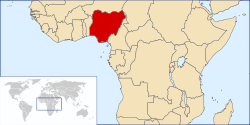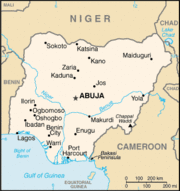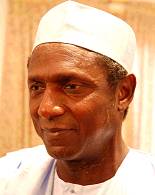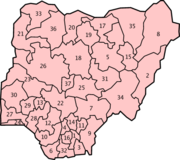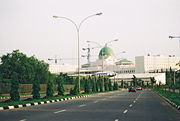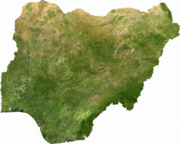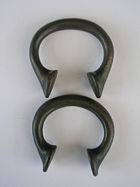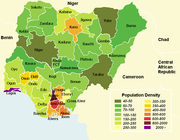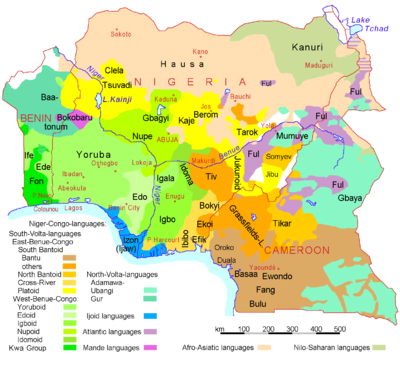Nigeria
2008/9 Schools Wikipedia Selection. Related subjects: Africa; African Countries
| Ìjọba-Àpapọ̀ Orílẹ̀-èdè Naìjírìà Republik Nijeriya جمهورية نيجيريا Republic nde Naigeria Republik Federaal bu Niiseriya Federal Republic of Nigeria
|
||||||
|---|---|---|---|---|---|---|
|
||||||
| Motto: "Unity and Faith, Peace and Progress" | ||||||
| Anthem: " Arise O Compatriots, Nigeria's Call Obey" |
||||||
|
|
||||||
| Capital | Abuja |
|||||
| Largest city | Lagos | |||||
| Official languages | English | |||||
| Recognised regional languages | Hausa, Igbo, Yoruba | |||||
| Demonym | Nigerian | |||||
| Government | Presidential Federal republic | |||||
| - | President | Umaru Yar'Adua ( PDP) | ||||
| - | Vice President | Goodluck Jonathan ( PDP) | ||||
| - | Senate President | David Mark ( PDP) | ||||
| - | Speaker of the House | Dimeji Bankole ( PDP) | ||||
| - | Chief Justice | Idris Kutigi | ||||
| Independence | from the United Kingdom | |||||
| - | Declared and recognized | October 1, 1960 | ||||
| - | Republic declared | October 1, 1963 | ||||
| Area | ||||||
| - | Total | 923,768 km² ( 32nd) 356,667 sq mi |
||||
| - | Water (%) | 1.4 | ||||
| Population | ||||||
| - | 2005 estimate | 133,530,0001 ( 9th) | ||||
| - | 2006 census | 140,003,542 (Not approved & preliminary) | ||||
| - | Density | 145/km² ( 71st) 374/sq mi |
||||
| GDP ( PPP) | 2006 estimate | |||||
| - | Total | $191.4 billion ( 47th²) | ||||
| - | Per capita | $1,500 ( 165th²) | ||||
| Gini (2003) | 43.7 (medium) | |||||
| HDI (2007) | ▲ 0.470 (low) ( 158th) | |||||
| Currency | Nigerian naira (₦) ( NGN) |
|||||
| Time zone | WAT ( UTC+1) | |||||
| - | Summer ( DST) | not observed ( UTC+1) | ||||
| Internet TLD | .ng | |||||
| Calling code | +234 | |||||
| 1 Estimates for this country explicitly take into account the effects of excess mortality due to AIDS; this can result in lower life expectancy, higher infant mortality and death rates, lower population and growth rates, and changes in the distribution of population by age and sex than would otherwise be expected. ² The GDP estimate is as of 2006; the total and per capita ranks, however, are based on 2005 numbers. | ||||||
Nigeria, officially named the Federal Republic of Nigeria, is a federal constitutional republic comprising thirty-six states and one Federal Capital Territory. The country is located in West Africa and shares land borders with the Republic of Benin in the west, Chad and Cameroon in the east, and Niger in the north. Its coast lies on the Gulf of Guinea, part of the Atlantic Ocean, in the south. The capital city is Abuja.
The people of Nigeria have an extensive history, and archaeological evidence shows that human habitation of the area dates back to at least 9000 BC. The Benue-Cross River area is thought to be the original homeland of the Bantu migrants who spread across most of central and southern Africa in waves between the 1st millennium BC and the 2nd millennium AD.
Nigeria is the most populous country in Africa and the eighth most populous country in the world with a population of over 140 million. The country is listed among the " Next Eleven" economies.
History
The Nok people in central Nigeria produced terracotta sculptures that have been discovered by archaeologists. In the northern part of the country, Kano and Katsina has recorded history which dates back to around AD 999. Hausa kingdoms and the Kanem-Bornu Empire prospered as trade posts between North and West Africa.
The Yoruba people date their presence in the area of modern republics of Nigeria, Benin and Togo to about 8500 BC. The kingdoms of Ifẹ and Oyo in the western block of Nigeria became prominent about 700-900 BC and 1400 BC respectively. Yoruba mythology believes that Ile-Ife is the source of the human race and that it predates any other civilization. Ifẹ produced the terra cotta and bronze heads, the Ọyọ extended as far as modern Togo. Another prominent kingdom in south western Nigeria was the Kingdom of Benin whose power lasted between the 15th and 19th century. Their dominance reached as far as the well known city of Eko which was named Lagos by the Portuguese traders and other early European settlers.
On October 1, 1960, Nigeria gained its independence from the United Kingdom. The new republic incorporated a number of people with aspirations of their own sovereign nations. Newly independent Nigeria's government was a coalition of conservative parties: the Nigerian People's Congress (NPC), a party dominated by Northerners and those of the Islamic faith, and the Igbo and Christian dominated National Council of Nigeria and the Cameroons (NCNC) led by Nnamdi Azikiwe, who became Nigeria's maiden Governor-General in 1960. Forming the opposition was the comparatively liberal Action Group (AG), which was largely dominated by Yorubas and led by Obafemi Awolowo.
An imbalance was created in the polity by the result of the 1961 plebiscite. Southern Cameroon opted to join the Republic of Cameroon while northern Cameroon chose to remain in Nigeria. The northern part of the country was now far larger than the southern part. The nation parted with its British legacy in 1963 by declaring itself a Federal Republic, with Azikiwe as the first president. When elections came about in 1965, the AG was outmanoeuvred for control of Nigeria's Western Region by the Nigerian National Democratic Party, an amalgamation of conservative Yoruba elements backed heavily by the Federal Government amid dubious electoral circumstances. This left the Igbo NCNC to coalesce with the remnants of the AG in a weak progressive alliance.
This disequilibrium and perceived corruption of the electoral and political process led in 1966 to several back-to-back military coups. The first was in January and led by a collection of young leftists under Major Emmanuel Ifeajuna & Chukwuma Kaduna Nzeogwu, it was partially successful - the coupists overthrew the embattled government but could not install their choice, jailed opposition leader Chief Obafemi Awolowo, General Johnson Aguiyi-ironsi, then head of the army was invited by the rump of the Balewa regime to take over the affairs of the country as head of state. This coup was counter-acted by another successful plot, supported primarily by Northern military officers and Northerners who favoured the NPC, it was engineered by Northern officers, which allowed Lt Colonel Yakubu Gowon to become head of state. This sequence of events led to an increase in ethnic tension and violence. The Northern coup, which was mostly motivated by ethnic and religious reasons was a bloodbath of both military officers and civilians, especially those of Igbo extraction.
The violence against Igbos increased their desire for autonomy and protection from the military's wrath. By May 1967, the Eastern Region had declared itself an independent state called the Republic of Biafra under the leadership Lt Colonel Emeka Ojukwu in line with the wishes of the people. The Nigerian side attacked Biafra on July 6, 1967 at Garkem signalling the beginning of the 30 month war that ended on January 1970. Following the war, Nigeria became to an extent even more mired in ethnic strife, as the defeated southeast and indeed southern Nigeria was now conquered territory for the federal military regime, which changed heads of state twice as army officers staged a bloodless coup against Gowon and enthroned Murtala Mohammed; Olusegun Obansanjo succeeded the former after an assassination.
During the oil boom of the 1970s, Nigeria joined OPEC and billions of dollars generated by production in the oil-rich Niger Delta flowed into the coffers of the Nigerian state. However, increasing corruption and graft at all levels of government squandered most of these earnings. The northern military clique benefited immensely from the oil boom to the detriment of the Nigerian people and economy. As oil revenues fuelled the rise of federal subventions to states and precariously to individuals, the Federal Government soon became the centre of political struggle and the centre became the threshold of power in the country. As oil production and revenue rose, the Nigerian government created a dangerous situation as it became increasingly dependent on oil revenues and the international commodity markets for budgetary and economic concerns eschewing economic stability. That spelled doom to federalism in Nigeria.
Beginning in 1979, Nigerians participated in a brief return to democracy when Obasanjo transferred power to the civilian regime of Shehu Shagari. The Shagari government was viewed as corrupt and incompetent by virtually all sectors of Nigerian society, so when the regime was overthrown by the military coup of Mohammadu Buhari shortly after the regime's fraudulent re-election in 1984, it was generally viewed as a positive development by most of the population. Buhari promised major reforms but his government fared little better than its predecessor, and his regime was overthrown by yet another military coup in 1985. The new head of state, Ibrahim Babangida, promptly declared himself President and Commander in chief of the Armed Forces and the ruling Supreme Military Council and also set 1990 as the official deadline for a return to democratic governance. Babangida's tenure was marked by a flurry of political activity: he instituted the International Monetary Fund's Structural Adjustment Program (SAP) to aid in the repayment of the country's crushing international debt, which most federal revenue was dedicated to servicing. He also inflamed religious tensions in the nation and particularly the south by enrolling Nigeria in the Organization of the Islamic Conference,
After Babangida survived an abortive coup, he pushed back the promised return to democracy to 1992. When free and fair elections were finally held on the 12th of June, 1993, Babangida declared that the results showing a presidential victory for Moshood Kashimawo Olawale Abiola null and void, sparking mass civilian violence in protest which effectively shut down the country for weeks and forced Babangida to keep his shaky promise to relinquish office to a civilian run government. Babangida's regime is adjudged to be at the apogee of corruption in the history of the nation as it was during his time that corruption became officially diluted in Nigeria.
Babangida's caretaker regime headed by Ernest Shonekan survived only until late 1993 when General Sani Abacha took power in another military coup. Abacha proved to be perhaps Nigeria's most brutal ruler and employed violence on a wide scale to suppress the continuing pandemic of civilian unrest. Abacha was not only brutal but very corrupt. While Babaginda encouraged his friends, family and himself to steal money, Abacha made corruption a family affair. Money had been found in various western European countries banks traced to him. He avoided coup plots by bribing army generals. Several hundred millions dollars in accounts traced to him were unearthed in 1999.
The regime would come to an end in 1998 when the dictator was found dead amid dubious circumstances. Abacha's death yielded an opportunity for return to civilian rule. Nigeria re-achieved democracy in 1999 when it elected Olusegun Obasanjo, a Yoruba and former military head of state, as the new President ending almost thirty three-years of military rule (between from 1966 until 1999) excluding the short-lived second republic (between 1979-1983) by military dictators who seized power in coups d'état and counter-coups during the Nigerian military juntas of 1966-1979 and 1983-1998.
Although the elections which brought Obasanjo to power in 1999 and again in 2003 were condemned as unfree and unfair, Nigeria has shown marked improvements in attempts to tackle government corruption and to hasten development. While Obasanjo showed willingness to fight corruption, he was accused by others of the same.
Umaru Yar'Adua, of the People's Democratic Party, came into power in the general election of 2007 - an election that was witnessed and condemned by the international community as being massively flawed.
Ethnic violence over the oil producing Niger Delta region (see Conflict in the Niger Delta), interreligious relations and inadequate infrastructure are current issues in the country.
Government and politics
Nigeria is a Federal Republic modelled after the United States, with executive power exercised by the president and with overtones of the Westminster System model in the composition and management of the upper and lower houses of the bicameral legislature.
The current president of Nigeria is Umaru Musa Yar'Adua who was elected in 2007. The president presides as both Chief of State and Head of Government and is elected by popular vote to a maximum of two four-year terms. The president's power is checked by a Senate and a House of Representatives, which are combined in a bicameral body called the National Assembly. The Senate is a 109-seat body with three members from each state and one from the capital region of Abuja; members are elected by popular vote to four-year terms. The House contains 360 seats and the number of seats per state is determined by population.
Ethnocentricism, tribalism, sectarianism (especially religious), and prebendalism have played a visible role in Nigerian politics both prior and subsequent to independence in 1960. Kin-selective altruism has made its way into Nigerian politics and has spurned various attempts by tribalists to concentrate Federal power to a particular region of their interests. Nationalism has also led to active secessionist movements such as MASSOB, Nationalist movements such as Oodua Peoples Congress, Movement for the Emancipation of the Niger Delta and a civil war. Nigeria's three largest ethnic groups have maintained historical preeminence in Nigerian politics; competition amongst these three groups, the Hausa, Yoruba, and Igbo, has fuelled corruption and graft.
Due to the above issues, Nigeria's current political parties are declaredly pan-national and irreligious in character (though this does not preclude the continuing preeminence of the dominant ethnicities). The major political parties at present include the ruling People's Democratic Party of Nigeria which maintains 223 seats in the House and 76 in the Senate (61.9% and 69.7% respectively) and is led by the current President Umaru Musa Yar'Adua; the opposition All Nigeria People's Party under the leadership of Muhammadu Buhari has 96 House seats and 27 in the Senate (26.6% and 24.7%). There are also about twenty other minor opposition parties registered. The outgoing president, Olusegun Obasanjo, acknowledged fraud and other electoral "lapses" but said the result reflected opinion polls. In a national television address he added that if Nigerians did not like the victory of his handpicked successor they would have an opportunity to vote again in four years.
Like in many other African societies, Prebendalism and extremely excessive corruption continue to constitute major challenges to Nigeria, as vote rigging and other means of coercion are practised by all major parties in order to remain competitive. In 1983, it was adjudged by the policy institute at Kuru that only the 1959 and 1979 elections witnessed minimal rigging.
Law
There are four distinct systems of law in Nigeria:
- English Law which is derived from its colonial past with Britain;
- common law, a development of its post colonial independence;
- customary law which is derived from indigenous traditional norms and practice, including the dispute resolution meetings of pre-colonial Yorubaland secret societies;
- Sharia law, used only in the predominantly Muslim north of the country. It is an Islamic legal system which had been used long before the colonial administration in Nigeria but recently politicised and spearheaded in Zamfara in late 1999 and eleven other states followed suit. These states are Kano, Katsina, Niger, Bauchi, Borno, Kaduna, Gombe, Sokoto, Jigawa, Yobe, and Kebbi.
The country has a judicial branch, the highest court of which is the Supreme Court of Nigeria.
States and local government areas
Nigeria is divided into thirty-six states and one Federal Capital Territory, which are further sub-divided into 774 Local Government Areas (LGAs). The plethora of states, of which there were only three at independence, reflect the country's tumultuous history and the difficulties of managing such a heterogeneous national entity at all levels of government.
Nigeria has six cities with a population of over 1 million people (from largest to smallest: Lagos, Kano, Ibadan, Kaduna, Port Harcourt, and Benin City). Lagos is the largest city in sub-Saharan Africa, with a population of over 10 million in its urban area alone.
Foreign relations and military
Foreign relations
Upon gaining independence in 1960, Nigeria made the liberation and restoration of the dignity of Africa the centrepiece of its foreign policy and played a leading role in the fight against the apartheid regime in South Africa; Nigeria's foreign policy was soon tested in the 1970s after the country emerged united from its own civil war and quickly committed itself to the liberation struggles going on in the Southern Africa sub-region. Though Nigeria never sent an expeditionary force in that struggle, it offered more than rhetoric to the African National Congress (ANC) by taking a committed tough line with regard to the racist regime and their incursions in southern Africa, in addition to expediting large sums to aid anti-colonial struggles. Nigeria was also a founding member of the Organization for African Unity (now the African Union), and has tremendous influence in West Africa and Africa on the whole. Nigeria has additionally founded regional cooperative efforts in West Africa, functioning as standard-bearer for ECOWAS and ECOMOG, economic and military organizations respectively.
With this African-centred stance, Nigeria readily sent troops to the Congo at the behest of the United Nations shortly after independence (and has maintained membership since that time); Nigeria also supported several Pan African and pro-self government causes in the 1970s, including garnering support for Angola's MPLA, SWAPO in Namibia, and aiding anti-colonial struggles in Mozambique, and Zimbabwe (then Rhodesia) military and economically.
Nigeria retains membership in the Non-Aligned Movement, and in late November 2006 organized an Africa-South America Summit in Abuja to promote what some attendees termed "South-South" linkages on a variety of fronts. Nigeria is also a member of the International Criminal Court, and the Commonwealth of Nations, from which it was temporarily expelled in 1995 under the Abacha regime.
Nigeria has remained a key player in the international oil industry since the 1970s, and maintains membership in Organization of the Petroleum Exporting Countries OPEC which it joined in July, 1971. Its status as a major petroleum producer figures prominently in its sometimes vicissitudinous international relations with both developed countries, notably the United States and more recently China and developing countries, notably Ghana, Jamaica and Kenya.
Millions of Nigerians have emigrated at times of economic hardship to Europe, North America and Australia among others. It is estimated that over a million Nigerians have emigrated to the United States and constitute the Nigerian American populace. Of such Diasporic communities include the "Egbe Omo Yoruba" society.
Military of Nigeria
The military in Nigeria have played a major role in the country's history since independence. Various juntas have seized control of the country and ruled it through most of its history. Its last period of rule ended in 1999 following the sudden death of dictator Sani Abacha in 1998.
Taking advantage of its role of sub-Saharan Africa's most populated country, Nigeria has repositioned its military as an African peacekeeping force. Since 1995, the Nigerian military through ECOMOG mandates have been deployed as peacekeepers in Liberia (1997), Ivory Coast (1997-1999), Sierra Leone 1997-1999, and presently in Sudan's Darfur region under an African Union mandate.
Active duty personnel in the three Nigerian armed services total approximately 115,000. The Nigerian Army, the largest of the services, has about 99,000 personnel deployed in two mechanized infantry divisions, one armoured division, one composite division (airborne and amphibious), the Lagos Garrison Command (a division size unit), the Abuja-based Brigade of Guards and other regimental size units (e.g. artillery brigade). It has demonstrated its capability to mobilize, deploy, and sustain battalions in support of peacekeeping operations in Liberia, former Yugoslavia, Angola, Rwanda, Somalia, and Sierra Leone. The Nigerian Navy (7,000 members) is equipped with frigates, fast attack craft, corvettes, and coastal patrol boats. The Nigerian Air Force (9,000 members) flies transport, trainer, helicopter, and fighter aircraft, many of which are currently non-operational, but there is an ongoing policy of reorganization, and the provision of a very professional armed forces with high capability. Nigeria also has pursued a policy of developing domestic training and military production capabilities.
Nigeria has continued a strict policy of diversification in military procurement from various countries. After the imposition of sanctions by many Western nations, Nigeria turned to the People's Republic of China, Russia, North Korea, and India for the purchase of military equipment and training.
Geography
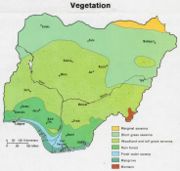
Nigeria is located in western Africa on the Gulf of Guinea and has a total area of 923,768 km² (356,669 mi²), making it the world's 32nd-largest country (after Tanzania). It is comparable in size to Venezuela, and is about twice the size of California. It shares a 4047 km (2515- mile) border with Benin (773 km), Niger (1497 km), Chad (87 km), Cameroon (1690 km), and has a coastline of at least 853 km.
The highest point in Nigeria is Chappal Waddi at 2,419 m (7,936 feet).
Nigeria has a varied landscape. From the Obudu Hills in the southeast through the beaches in the south, the rainforest, the Lagos estuary and savannah in the middle and southwest of the country and the Sahel to the encroaching Sahara in the extreme north.
Nigeria's main rivers are the Niger and the Benue which converge and empty into the Niger Delta, the world's largest river deltas.
Nigeria is also an important centre for biodiversity. It is widely believed that the areas surrounding Calabar, Cross River State, contain the world's largest diversity of butterflies. The drill monkey is only found in the wild in Southeast Nigeria and neighboring Cameroon.
Environment
Environmental degradation
Nigeria's Delta region, home of the large oil industry, experiences serious oil spills and other environmental problems. See Environmental issues in the Niger Delta for more details, and Conflict in the Niger Delta about strife which has arisen in connection with those issues.
Waste management including sewage treatment, the linked processes of deforestation and soil degradation, and climate change or global warming are the major environmental problems in Nigeria.
Waste management presents problems in a mega city like Lagos and other major Nigerian cities which are linked with economic development, population growth and the inability of municipal councils to manage the resulting rise in industrial and domestic waste. Haphazard industrial planning, increased urbanization, poverty and lack of competence of the municipal government are seen as the major reasons for high levels of waste pollution in major Nigerian cities. Some of the 'solutions' have been disastrous to the environment, resulting in untreated waste being dumped in places where it can pollute waterways and groundwater.
In terms of global warming, Africans contribute only about one metric ton of carbon dioxide per person per year. It is perceived by many climate change experts that food production and security in the northern sahel region of the country will suffer as semi-arid areas will have more dry periods in the future.
Economy
The currency unit of Nigeria is the Nigerian Naira.
Years of military rule, corruption, and mismanagement have hampered economic activity and output in Nigeria and continue to do so, despite the restoration of democracy and subsequent economic reform. According to the Economist Intelligence Unit and the World Bank, Nigerian GDP at purchasing power parity was only at $170.7 billion as of FY 2005. The GDP per head is at $692.
Petroleum plays a large role in the Nigerian economy, accounting for 40% of the GDP. It is the 12th largest producer of petroleum in the world and the 8th largest exporter, and has the 10th largest proven reserves and the country was also a founding member of OPEC. However, due to crumbling infrastructure, corruption, and ongoing civil strife in the Niger Delta, its main oil producing region, oil production and export is not at 100% capacity.
Mineral resources that are present in Nigeria but not yet fully exploited are coal and tin. Other natural resources in the country include iron ore, limestone, niobium, lead, zinc, and arable land. Despite huge deposits of these natural resources, the mining industry in Nigeria is almost non-existent. About 60% of Nigerians are employed in the agricultural sector. Agriculture used to be the principal foreign exchange earner of Nigeria. Perhaps, one of the most daunting ramifications of the discovery of oil was the decline of agricultural sector. So tragic was this neglect that Nigeria, which in the 1960s grew 98% of his own food and was a net food exporter, now must import much of the same cash crops it was formerly famous for as the biggest exporter. Agricultural products include groundnuts, palm oil, cocoa, coconut, citrus fruits, maize, pearl millet, cassava, yams and sugar cane. It also has a booming leather and textile industry, with industries located in Kano, Abeokuta, Onitsha, and Lagos.
Like many Third World nations, Nigeria accumulated a significant foreign debt. Many of the projects financed by these debts were inefficient, bedeviled by corruption or failed to live up to expectations. Eventually, Nigeria defaulted on its principal debt repayments as arrears and penalty interest accumulated and increased the size of the debt. However, after a long campaign by the Nigeria authorities, in October 2005 Nigeria and its Paris Club creditors reached an agreement that reduced Nigeria's debt by approximately 60%. Nigeria used part of its oil windfall to pay the residual 40%, freeing up at least $1.15 billion annually for poverty reduction programmes. As of April 2006, Nigeria became the first African Country to fully pay off her debt (estimated $30billion) owed to the Paris Club.
Nigeria also has significant production and manufacturing facilities such as factories for the French car manufacturer Peugeot, the English truck manufacturer Bedford, now a subsidiary of General Motors. Nigeria also manufactures t-shirts and processed food.
Demographics
Nigeria is the most populous country in Africa but exactly how populous is a subject of speculation. The United Nations estimates that the population in 2004 was at 131,530,000 , with the population distributed as 48.3% Urban and 51.7% rural and population density at 139 people per square km. National census results in the past few decades have been disputed. The results of the most recent census by the Government of Nigeria have been released 29 December 2006. The census gave a population of 140.003.542. The only breakdown available was Total: 140.003.542 Men: 71.709.859 Women: 68.293.083
According to the United Nations, Nigeria has been undergoing explosive population growth and one of the highest growth and fertility rates in the world. By their projections, Nigeria will be one of the countries in the world that will account for most of the world's total population increase by 2050. According to current data, one out of every four Africans is Nigerian. Presently, Nigeria is the ninth most populous country in the world, and even conservative estimates conclude that more than 20% of the world's black population lives in Nigeria. 2006 estimates claim 42.3% of the population is between 0-14 years of age, while 54.6% is between 15-65; the birth rate is significantly higher than the death rate, at 40.4 and 16.9 per 1000 people respectively.
Health, health care, and general living conditions in Nigeria are poor. Life expectancy is 47 years (average male/female) and just over half the population has access to potable water and appropriate sanitation; the percentage is of children under five has gone up rather than down between 1990 and 2003 and infant mortality is 97.1 deaths per 1000 live births. HIV/AIDS rate in Nigeria is much lower compared to the other African nations such as Kenya or South Africa whose prevalence (percentage) rates are in the double digits. Nigeria, like many developing countries, also suffers from a polio crisis as well as periodic outbreaks of cholera, malaria, and sleeping sickness. As of 2004, there has been a vaccination drive, spearheaded by the W.H.O., to combat polio and malaria that has been met with controversy in some regions.
Education is also in a state of neglect, though after the oil boom on the oil price in the early 1970s, tertiary education was improved so it would reach every subregion of Nigeria. Education is provided free by the government, but the attendance rate for secondary education is only 29% (average male 32%/female 27%). The education system has been described as "dysfunctional" largely due to decaying institutional infrastructure. 68% of the population is literate, and the rate for men (75.7%) is higher than that for women (60.6%).
Ethno-linguistic groups
Nigeria has more than 250 ethnic groups, with varying languages and customs, creating a country of rich ethnic diversity. The largest ethnic groups are the Fulani/ Hausa, Yoruba, Igbo, accounting for 68% of population, while the Edo, Ijaw (10%), Kanuri, Ibibio, Ebira Nupe and Tiv comprise 27%; other minorities make up the remaining 7 percent. The middle belt of Nigeria is known for its diversity of ethnic groups, including the Pyem, Goemai, and Kofyar.
There are small minorities of British, Americans, East Indians, Chinese, Japanese, Syrian, Lebanese and refugees and immigrants from other West African or East African nations. These minorities mostly reside in major cities such as Lagos and Abuja, or in the Niger Delta as employees for the major oil companies. A number of Cubans settled Nigeria as political refugees following the Cuban Revolution. A number of them include Afro-Cubans and mixed-raced Cubans.
In the middle of the nineteenth century, a number of ex-slaves of Afro-Cuban and Afro-Brazilian descent and emigrants from Sierra Leone established communities in Lagos, Ibadan and other regions of Nigeria. Many ex-slaves came to Nigeria following the emancipation of slaves in Latin America. Many of the immigrants, sometimes called Saros (immigrants from Sierra Leone) and Amaro (ex-slaves from Brazil) later became prominent merchants and missionaries in Lagos and Abeokuta.
Language
The number of languages currently estimated and catalogued in Nigeria is 521. This number includes 510 living languages, two second languages without native speakers and 9 extinct languages. In some areas of Nigeria, ethnic groups speak more than one language. The official language of Nigeria, English, was chosen to facilitate the cultural and linguistic unity of the country. The choice of English as the official language was partially related to the fact that a part of Nigerian population spoke English as a result of British colonization that ended in 1960.
The major languages spoken in Nigeria represent three major families of African languages - the majority are Niger-Congo languages, such as Yoruba, Ibo, the Hausa language is Afro-Asiatic; and Kanuri, spoken in the northeast, primarily Borno State, is a member of the Nilo-Saharan family. Even though most ethnic groups prefer to communicate in their own languages, English, being the official language, is widely used for education, business transactions and for official purposes. English as a first language, however, remains an exclusive preserve of a small minority of the country's urban elite, and is not spoken at all in some rural areas. With the majority of Nigeria's populace in the rural areas, the major languages of communication in the country remain indigenous languages. Some of the largest of these, notably Yoruba and Ibo, have derived standardized languages from a number of different dialects and are widely spoken by those ethnic groups. Hausa is a lingua franca throughout much of West Africa, and serves this function in Northern Nigeria as well, particularly amongst the Muslim population. Nigerian Pidgin English, often known simply as ' Pidgin' or 'Broken' (Broken English), is also as a popular lingua franca, though with varying regional influences on dialect and slang.The pidgin English or Nigerian English is widely spoken within the Niger Delta Regions, predominately in Warri,Sapele, Port-Harcourt, Agenebode, Benin City etc. The Yoruba language has the most varied forms and dialects. This variation is usually based on the different towns or as it were Kingdoms that existed before the advent of Europeans. They are as diverse as the number of city states that there are. Examples are Awori, Ondo/Ekiti, Egba/Yewa, Oyo/Ibadan, Ijebu, Ijesa/Ife, Ilorin, Kabba/Okun.
Crime and Punishment
Advance fee fraud (also known as "419" and the "Nigerian scam") is a form of organized crime that is commonly associated with Nigeria, though it is now used in other places. The scammer persuades the target to advance relatively small sums of money (the advance fee) in the hope of realizing a much larger gain (usually touted as millions). In 2003, the Economic and Financial Crimes Commission (or EFCC) was created to combat this and other forms of organized financial crime. It has succeeded in bringing several "419" kingpins to justice and in some cases has been able to return the stolen money to victims.
Societal issues
Despite its vast government revenue from the mining of petroleum, Nigeria is beset by a number of societal problems due primarily to a history of inept governance. Some of these problems are listed below.
New Nations
There is dynamic dissonance between the Nigerian federation and some of its encapsulated sovereign peoples. At different times, the Hausa (Arewa), Igbo/Ibo (Biafra), Niger Delta region, and Yoruba (Oduduwa) have threatened or agitated to form break-away republics. No secession attempt has yet succeeded, although the clamour grows as each change of government is followed by bitter wrangling about control of mineral resources. Arewa and Biafra would be land-locked countries. The Delta is an oil enclave. Yorubaland is on the Atlantic coast and sustains a diversified and vibrant economy.
Human rights
Homosexuality is illegal in Nigeria as it runs counter to the country's deeply ingrained cultural and religious morals. Homosexual intercourse is punishable by imprisonment in the south and possibly death in the Muslim north.
On February 14, 2007 The National Assembly held public hearings on a bill to ban gay marriage and criminalize virtually all forms of gay expression. The bill reads as follows:
Any person who is involved in the registration of gay clubs, societies and organizations, sustenance, procession or meetings, publicity and public show of same sex amorous relationship directly or indirectly in public and in private is guilty of an offence and liable on conviction to a term of five years imprisonment.
In April 2007, the voluntary Sharia police of Nigeria known as the Hisbah issued arrest warrants against an alleged lesbian who married four women in a large celebration in Kano, Nigeria.
Strife and sectarian violence
Due to its multitude of diverse, sometimes competing ethno-linguistic groups, Nigeria has been beset since prior to independence with sectarian tensions and violence. This is particularly true in the oil-producing Niger Delta region, where both state and civilian forces employ varying methods of coercion in attempts gain control over regional petroleum resources. The civilian population, and especially certain ethnic groups like the Ogoni, have experienced severe environmental degradation due to petroleum extraction, but when these groups have attempted to protest these injustices, they have been met with repressive measures by Nigerian government and military forces. As a result, strife and deterioration in this region continues as of 2006.
There are also significant tensions on a national scale, especially between the primarily Muslim, highly conservative northern population and the Christian population from the Southern part of the country.
Since the end of the civil war in 1970, ethnic and religious violence has continued. Violence between Muslims and Christians occurred until early 2004. There has subsequently been a period of relative harmony since the Federal Government introduced tough new measures against religious violence in all affected parts of the country.
In 2002, organizers of the Miss World Pageant announced that they would move the pageant from the Nigerian capital, Abuja, to London in the wake of violent protests in the Northern part of the country that left more than 100 people dead and over 500 injured. The rioting erupted after a newspaper suggested Muhammad would have approved of the Miss World beauty contest for personal reasons. Muslim rioters in Kaduna killed an estimated 105 men, women, and children with a further 521 injured taken to hospital. Angry mobs in the mainly Muslim city 600 kilometres (375 miles) northeast of Lagos burnt churches and rampaged through the streets, stabbing, bludgeoning, and burning bystanders to death.
Health issues
Nigeria has been reorganizing its health system since the Bamako Initiative of 1987 formally promoted community-based methods of increasing accessibility of drugs and health care services to the population, in part by implementing user fees. The new strategy dramatically increased accessibility through community-based healthcare reform, resulting in more efficient and equitable provision of services. A comprehensive approach strategy was extended to all areas of health care, with subsequent improvement in the health care indicators and improvement in health care efficiency and cost.
The state of health care in Nigeria has been worsened by a shortage of doctors as a consequence of severe ' brain drain'. Many Nigerian doctors have emigrated to North America and Europe. In 1995, 21,000 Nigerian doctors were practising in the US alone, about the same as the number of doctors then in the Nigerian public service. Retaining these expensively-trained professionals has been identified as an urgent goal.
National well-being
In 2003, Nigerians were reported to be the happiest people in a scientific survey carried out in 65 nations in 1999-2000. The research was reported by one of the world's top science magazines, New Scientist, and was picked up by a number of news outlets. See Nigeria tops happiness survey. The report considered that the country's family life and culture were more important than its problems and material wealth in determining happiness.


